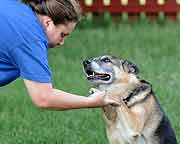
TUESDAY, May 13, 2014 (HealthDay News) — A new study may provide the best evidence yet that the superbug known as MRSA can travel between humans and their pets, although researchers caution that people shouldn’t worry too much about the germ lurking in their cats and dogs.
In the big picture, the findings reveal how the use of antibiotics can affect germs that infect both people and animals, explained study author Ewan Harrison, a research associate with the University of Cambridge in England.
The research also shows how “infectious diseases in humans and animals are intrinsically linked and should be seen as a single problem to be addressed jointly by human and veterinary medicine,” he said.
Methicillin-resistant Staphylococcus aureus, better known as MRSA, causes infections in the skin, in the bloodstream and elsewhere in the body.
Once mainly limited to sick people in hospitals and nursing homes, MRSA has spread into the world at large, often infecting healthy people such as prisoners and athletes who share supplies like towels and razors. MRSA can be deadly, and it can’t easily be vanquished by antibiotics.
It’s no secret that MRSA can travel between species. In one well-known case, a newborn elephant at a zoo died after a human taking care of her accidentally infected her with MRSA.
But while some types of MRSA appear “to be able to transmit easily between different species, others seem to be restricted to one or a small number of animal species, possibly due to specific adaptations to one species making the bacteria less able to infect others,” Harrison said.
In the new study, the researchers sought to better understand how MRSA travels between species. They analyzed the genetic makeup of MRSA strains from cats and dogs in England and discovered evidence of a “human source” for the germs in the animals.
The researchers also found evidence that the MRSA germs in the animals were developing resistance — immunity — to the antibiotic clindamycin, which veterinarians use in the U.K. The germs were less likely to have developed immunity against the antibiotic erythromycin, which is used less.
“This demonstrates how the use of antibiotics in both human and animals medicine can alter the population of a bacteria that can causes infections in both,” Harrison said.
It’s not clear if the same goes for other types of germs, he said.
Dr. J. Scott Weese, an associate professor with the department of pathobiology at the University of Guelph in Canada, said the study “doesn’t change anything but does give more support to the ongoing hypothesis that pet MRSA is ultimately usually human in origin.”
“Since MRSA in pets is usually human-associated, if someone’s dog has MRSA, the owner is probably either the source or there’s someone else in the household that is MRSA-positive and probably a greater source than the dog,” he said.
What to do?
“Pet owners shouldn’t be overly concerned directly about MRSA in their animals other than reinforcing the message of good hygiene when handling pets,” Harrison said. Experts recommend frequent hand washing when a pet or his or her human has a MRSA infection.
As for future research, “we are currently using similar genome sequencing technology to understand transmission between humans and animals in a veterinary hospital setting,” Harrison said. “We also hope to investigate larger collections of different types of MRSA to discover whether the findings of our study are more general to other types of MRSA.”
The study was published online recently in mBio, a journal of the American Society for Microbiology.
More information
For more about MRSA, try the Centers for Disease Control & Prevention.
Copyright © 2026 HealthDay. All rights reserved.

